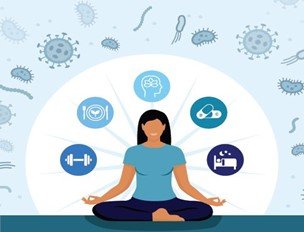
Looking to give your immune system a boost? You’re not alone there. The current pandemic has people looking for ways to protect themselves. Your immune system is your first line of defence against viruses, bacteria or pathogens that could cause you harm. But it only works effectively if you’re getting everything you need to make it strong. In this post, I’ll be sharing some tips on how you can boost your immune system naturally.
1.Take Care of Your Gut Microbiome
There’s been a lot of talk about the microbiome lately. Which makes perfect sense considering that it’s made up of trillions of bacteria that live in your digestive tract. Turns out, these bacteria have a massive effect on not only your overall health but the health of your immune system as well. Luckily, there’s a lot you can do to help because your gut microbiome is heavily influenced by lifestyle factors. That is, what you eat, how much sleep you get, how much stress you experience, your exercise habits, environmental toxins and more. Making some adjustments in these areas can improve both the health of your gut and your immune system.
Diet is a huge factor in what kind of bacteria populate your gut microbiome. A diet full of animal-based foods, processed foods and sugar will result in bacteria that can produce harmful byproducts. On the other hand, a healthy plant-based diet causes different types of bacteria to populate in your gut microbiome. These fibre-loving gut bugs produce short-chain fatty acids (SCFAs) as they digest the fibre you consume. These SCFAs have been shown to have numerous beneficial effects on the body like reducing inflammation and strengthening your immune system.
The good news is, it’s not too late to have a positive influence on your gut microbiome. When you adjust your diet, significant changes in the population of your gut bacteria can be seen within about 3 days. Increasing your plant and fibre consumption while decreasing or eliminating processed, sugary and animal-based foods can have a big impact on the strength of your immune system.
2.Eat Whole Plant Foods
Nutrition plays a huge role in supporting a healthy immune system. As mentioned in the section above, a diet rich in unprocessed plants helps to populate favourable gut bacteria that produce beneficial short-chain fatty acids. The fibre these foods contain also helps to keep those good gut bugs fed. But the benefits of whole plant foods do not end there.
Those unprocessed plant foods are brimming with essential vitamins and minerals that your body needs in order to perform optimally. This is important because people who don’t consume enough micronutrients are more prone to illness. Calories and macronutrients (protein, carbohydrates and fat) are important parts of the diet, but micronutrients (vitamins and minerals) are necessary to keep you in good health. It’s been shown that just 2 weeks of neglecting your fruit and veggie consumption can cause your immune function to plummet.
Whole plant foods also contain many beneficial compounds including antioxidants and phytochemicals like flavonoids and polyphenols. These compounds help to boost immune function by stimulating the cells responsible for fighting off pathogens you come into contact with. These plant compounds also help to fight off inflammation in the body. This is vital because chronic inflammation taxes the immune system over time. Leaving it weakened and unable to respond to all potential threats.
- Specific Foods to Include
Beyond eating unprocessed plant foods, here are some specific foods that have been shown to boost your immune system.
Garlic has been long touted for its health benefits, including antibacterial effects. There is also evidence that it can help to clear bacteria from your lungs.
Mushrooms contain many compounds that help boost immune function and reduce inflammation. Consider trying different varieties like shiitake, crimini, chaga and more.
Fermented foods, like kimchi, sauerkraut, tempeh and kombucha. These foods actually increase the number of healthy bacteria in the gut which has a positive effect on the immune system.
Raw Cacao is 犀利士
loaded with antioxidants and has been found to stimulate the immune system.
Kale is one of those beneficial leafy greens that help to naturally detoxify the body. It has also been found to increase the production of antibodies, which help the immune system eliminate pathogens.
Ceylon cinnamon has anti-inflammatory properties and has been shown to have antimicrobial and immune-stimulating effects.
Green tea contains many beneficial compounds, including catechins. It’s been shown to have antimicrobial effects and boosts the immune system by improving the effectiveness and production of T cells. These T cells are part of the first line of immune defence.
3. Get Your Vitamin D
Vitamin D is a hormone that’s actually produced in your skin when it is exposed to sunlight. Sounds easy enough, but unless you’re living in tropical climates, this can be a common deficiency. This is problematic in a number of ways, one of which is that vitamin D deficiency has a negative impact on your immune system. In fact, it’s been found that inadequate levels of vitamin D can make you more susceptible to infection.
How do you avoid vitamin D deficiency? Expose your bare skin (arms, legs, face and neck) to mid-day sunlight (without sunscreen). Fifteen minutes should do it for lighter skin tones, or 30 minutes for darker skin tones.
This can be difficult to do all year round, especially if you live in colder climates. In that case, consider supplementing with 2000 IU of vitamin D3 a day. Especially during the darker and colder months when there are fewer hours of sunlight and you’re more likely to be bundled up.
4. Get Adequate B12
Another important nutrient to consider is vitamin B12. While B12 is typically associated with nerve function, it also plays an important role in the production of white blood cells. Being deficient in B12 can inhibit immune function, so it’s important to be sure you’re getting enough.
B12 is actually made by microbes found in the soil. As a society, our hygiene standards surrounding food have increased dramatically, so we no longer consume soil along with our garden goodies. Some forms of livestock are injected with B12, but even those who consume meat are often deficient in this important vitamin.
It is important not to disregard this important vitamin, especially if you’re fuelling with plants. A B12 supplement is cheap and effective, making it the best way to ensure you’re meeting your body’s needs. The recommended dose is 2500 mcg once a week, or 250 mcg a day, taken on an empty stomach.
5. Avoid Added Sugar
I don’t mean to be a buzz kill here, but added sugars are not ideal for your immune system. Now, I want to take a moment to clear up the phrase ‘added sugars’. I’m not referring to the naturally occurring sugars found in fruit and some vegetables. I’m referring to the highly refined powders or syrups that are typically added to processed food and beverages.
Consuming a lot of added sugars in your day can alter the body’s natural killer cells that are responsible for fighting off infection. It also suppresses your immune function for up to 4 hours. So, you may want to re-think sugary beverages like soda or consider sweetening your homemade treats with fruit instead of sugar.
6. Exercise Regularly
Another way to naturally boost the immune system is through exercise. Regularly moving your body can not only b犀利士
oost your immune system but speed up recovery as well. It also helps to alleviate stress, which can really suppress immune function. Studies show that those who exercise regularly, have higher circulating levels of neutrophils and leucocytes. These are both active parts of the immune system that are involved in fighting off infection.
Before you lace up your runners, it’s important to note that intense exercise can actually suppress your immune function, just like stress. Stick to moderate exercise, ideally for 60 minutes a day. Making this a daily habit in your life can boost immune function and help you stay healthy.

7. Reduce Stress
It’s common knowledge that stress has a negative impact on your overall health. This is true of your immune system as well. It’s been shown that stress not only suppresses your immune system but also increases the likelihood that you’ll get sick. This is true of fear, anxiety and depression as well. Chronic stress, anxiety and depression have been shown to reduce the active parts of the immune system that are responsible for fighting infection. This makes it even more important to look after your mental health.
To reduce your stress levels, try some of the following:
Daily exercise – A brisk walk, yoga, sports, dance, workout video, whatever you enjoy.
Meditation – Take some time to shut out the world and focus on your breath. Guided meditations are a great option for beginners, as they guide you through the process. Try an app like Calm or Headspace. You can also find guided meditations on streaming services like Spotify.
Cuddle a critter – Positive interactions with animals are known to help reduce feelings of anxiety and stress. If you have a furry friend, spend some time with them and bask in the unconditional love.
Have a good laugh – Watch a funny video, an episode of your favourite sitcom or chat with your hilarious friend. Laughing releases feel-good chemicals called endorphins in the brain and helps to alleviate stress.
Turn on some tunes – Music has a powerful influence over emotions. Try something soothing like classical or instrumental to help your stress melt away or some upbeat tunes that you enjoy.
Get outside – Getting out in nature has some real healing powe壯陽藥
rs and can be very grounding. Try getting outside to enjoy some fresh air.
Get Adequate Sleep
This one shouldn’t be a surprise. After all, sleep allows the body time to rest and repair. While it’s doing all of that resting and repairing, it’s also restoring the function of your immune system. But not any sleep will do, you need good quality sleep, ideally 7-9 hours a night.
There was a study done to test the effect sleep had on the ability to fight off the common cold. All participants were exposed to the cold virus via nasal drops. Those who had inadequate sleep in the 14 days prior were 3-5 times more likely to develop a cold after the exposure.
Prioritizing sleep will benefit your body in a number of ways beyond helping your immune system. Increase the quality of your sleep by avoiding technology right before bed. Instead, read a book or do some calming activities that don’t involve a screen for the last hour or two before bed.